Key takeaways:
- Capital punishment poses risks of irreversible consequences, including wrongful executions, raising ethical concerns about the justice system’s integrity.
- There is a significant inequity in the application of the death penalty, disproportionately affecting marginalized communities.
- The emotional and psychological impacts extend beyond the executed individuals, affecting families, communities, and those involved in the execution process.
- Conversations about capital punishment should focus on empathy, shared values, and evidence to foster understanding and challenge existing beliefs.
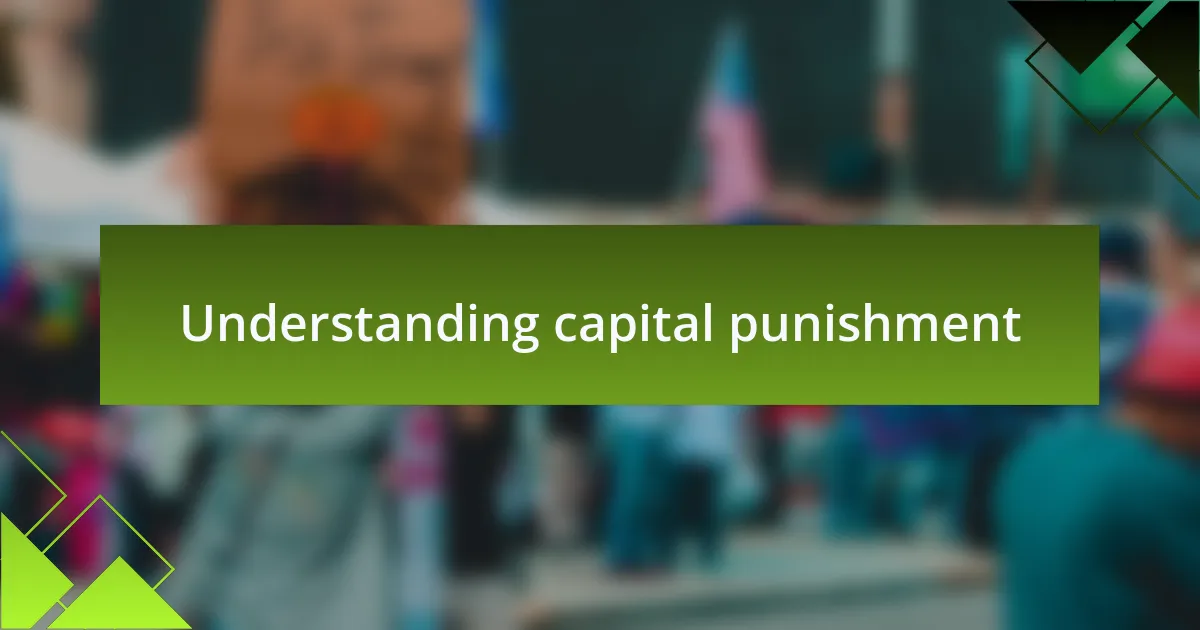
Understanding capital punishment
Capital punishment, often shrouded in controversy, is the state-sanctioned execution of individuals found guilty of certain crimes. I remember a conversation I had with a friend who vehemently supported the death penalty; it made me consider how deeply personal beliefs shape our views on justice. What does it say about our society when we allow the government to take a life?
Many argue that capital punishment serves as a deterrent, but does it really prevent crime? Personally, I find the statistics on crime rates before and after executions to be quite telling. In my experience, fear of execution doesn’t seem to stop those in desperate situations, which leads me to wonder if we’re missing the bigger picture when discussing the root causes of crime.
There’s also the moral and ethical weight of taking a life; I often think about the potential for wrongful convictions. Can we accept a system that risks executing an innocent person? It’s a heavy thought that drives home the need for a deep understanding of the implications surrounding capital punishment, not just legally, but also ethically and emotionally.
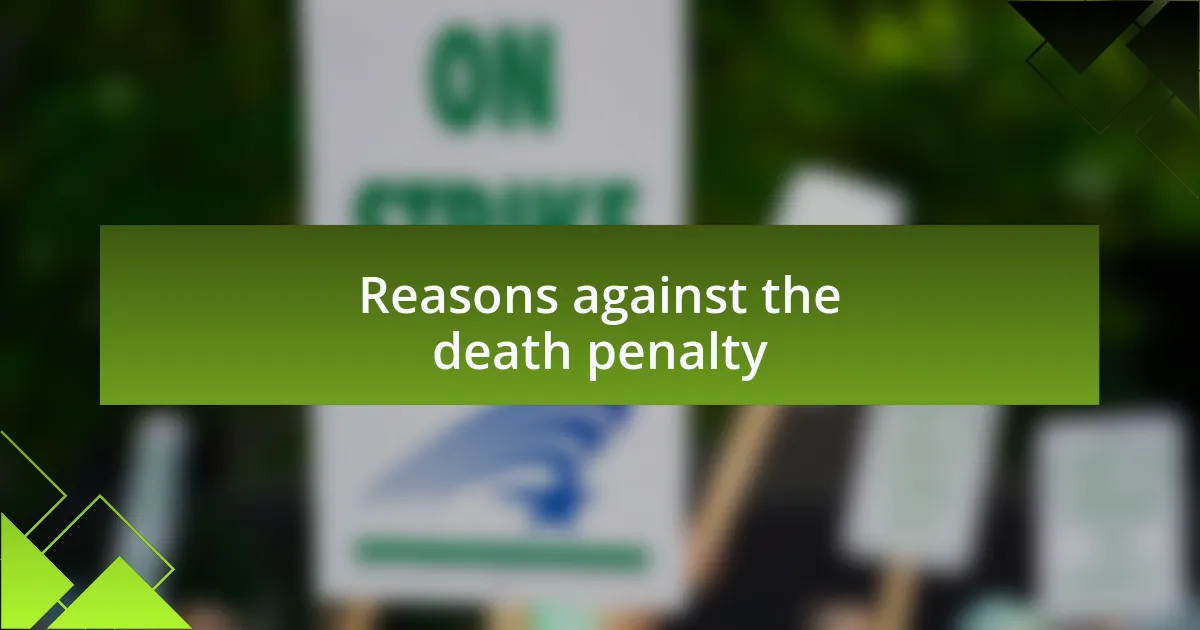
Reasons against the death penalty
One significant reason against the death penalty is the irreversible nature of the punishment. I remember reading about a case in Illinois where a man was exonerated after spending years on death row for a crime he didn’t commit. How can we trust a system that, despite its best intentions, can lead to such devastating mistakes? It’s a haunting reminder of the risks involved when a state decides to take a life.
Another argument that resonates with me is the biased application of capital punishment. It’s concerning to see that marginalized communities often bear the brunt of these sentences, highlighting systemic inequities that are embedded within our judicial system. Is it fair that someone’s life hangs in the balance based on factors like race or economic status? This disparity leaves me questioning not just the morality, but the integrity of a system that claims to uphold justice for all.
Let’s not overlook the emotional toll it takes on families. I once spoke to a woman whose brother was executed; the pain on her face was palpable as she recounted the lasting trauma on her family. What does it mean for the loved ones left behind when a life is extinguished? It’s essential to consider the broader implications – the ongoing suffering caused not only to the executed but also to their families and communities.
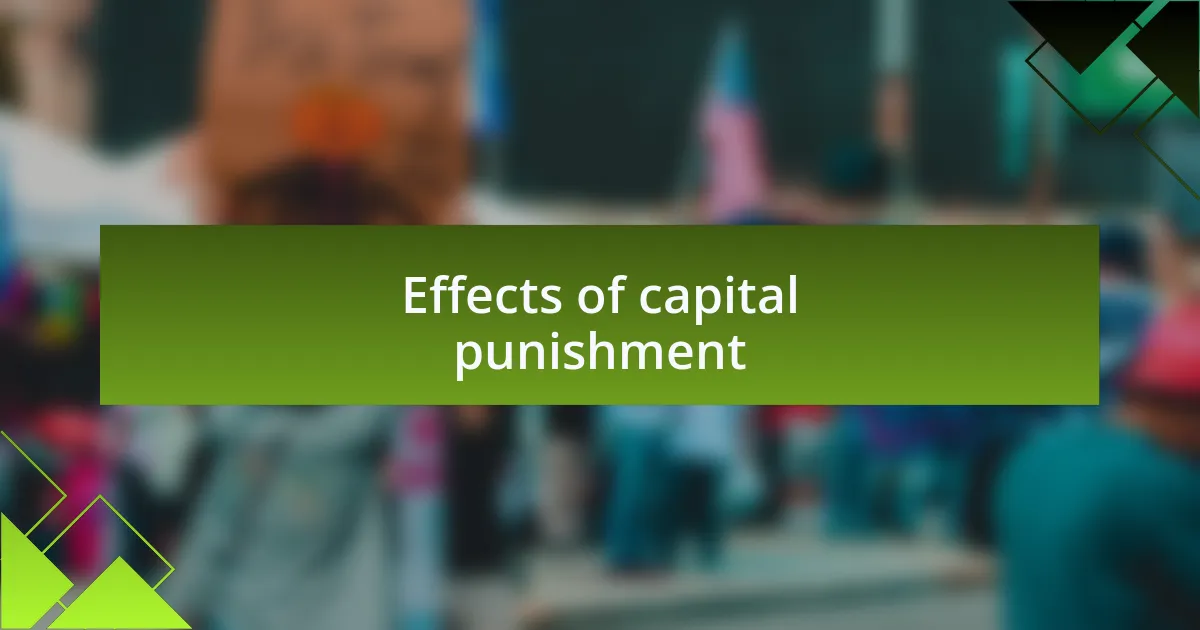
Effects of capital punishment
Capital punishment has far-reaching effects that ripple throughout society. I once encountered a former prison guard who shared how witnessing executions affected his mental health. His struggle with anxiety and nightmares highlighted a stark truth: those involved in the process also carry the emotional burden of taking a life. How often do we consider the psychological impact on those who facilitate this state-sanctioned act?
Moreover, capital punishment creates a cycle of violence that permeates communities. I remember attending a community forum where we discussed the lasting fear instilled in residents by knowing that their government can legally decide to end a life. It raises a crucial question: does this practice genuinely deter crime, or does it simply perpetuate a culture of retribution and despair? The atmosphere in that room was heavy, as participants shared stories of lost friends and family, illustrating the pervasive sense of hopelessness.
Lastly, the economic ramifications of maintaining a death penalty system cannot be ignored. From legal fees to lengthy appeals and housing death row inmates, the costs can spiral out of control. I once calculated the expenses related to a high-profile case, and the figures were staggering; it made me reconsider how our resources could be better utilized. Shouldn’t our financial investments be directed toward prevention and rehabilitation rather than a cycle of execution?
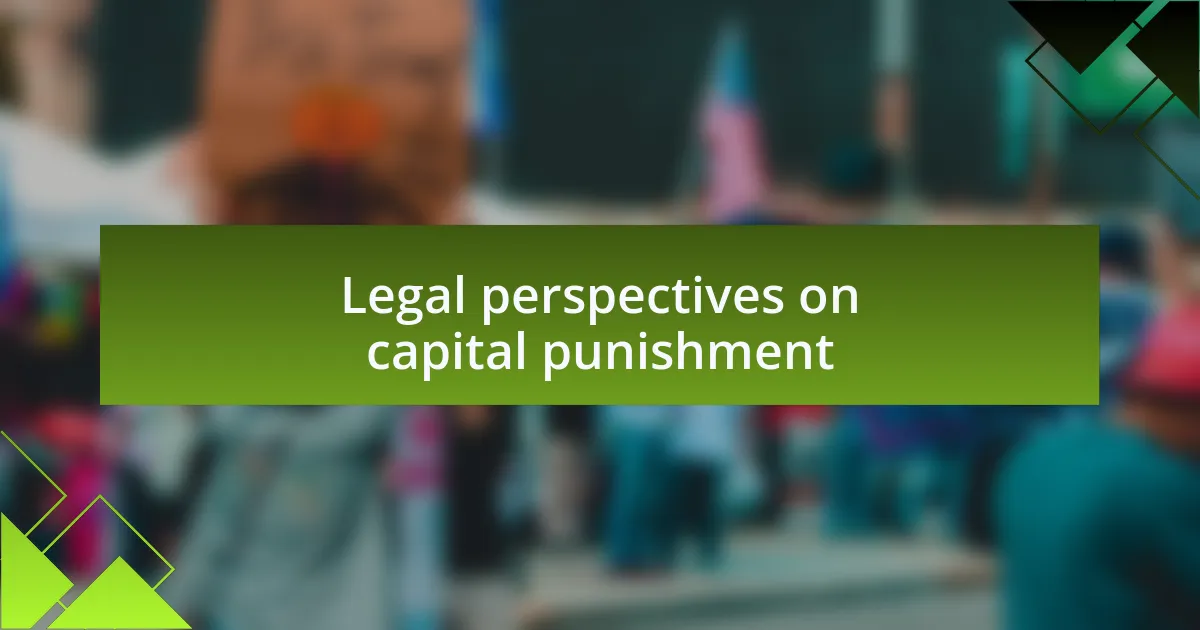
Legal perspectives on capital punishment
The legal landscape surrounding capital punishment is complex and deeply divided. I often find myself pondering how court rulings and legislative actions can be so inconsistent, reflecting a myriad of beliefs about justice and morality. For instance, some states uphold it as a necessary deterrent, while others have abolished it entirely, leading to a patchwork of laws across the country. Have you ever considered how this inconsistency impacts the lives of those affected by these decisions?
One case that struck a chord with me was the Supreme Court’s ruling in Furman v. Georgia in 1972, which temporarily halted the death penalty due to its arbitrary application. The justices highlighted that the way it was administered often depended on race and socioeconomic status, prompting me to think: how fair can a system be that allows such disparities? The emotional weight of knowing that someone’s life can hinge on these factors is a thought that lingers long after one encounters such rulings.
Furthermore, discussing the legal ramifications without acknowledging the international perspective seems incomplete. As I delve into conversations about capital punishment, I often reference countries that have abolished it, like Canada and many European nations. Their commitment to human rights and dignity resonates deeply with me. It begs the question: what can we learn from their experiences to shape a more humane approach to justice in our own legal system?
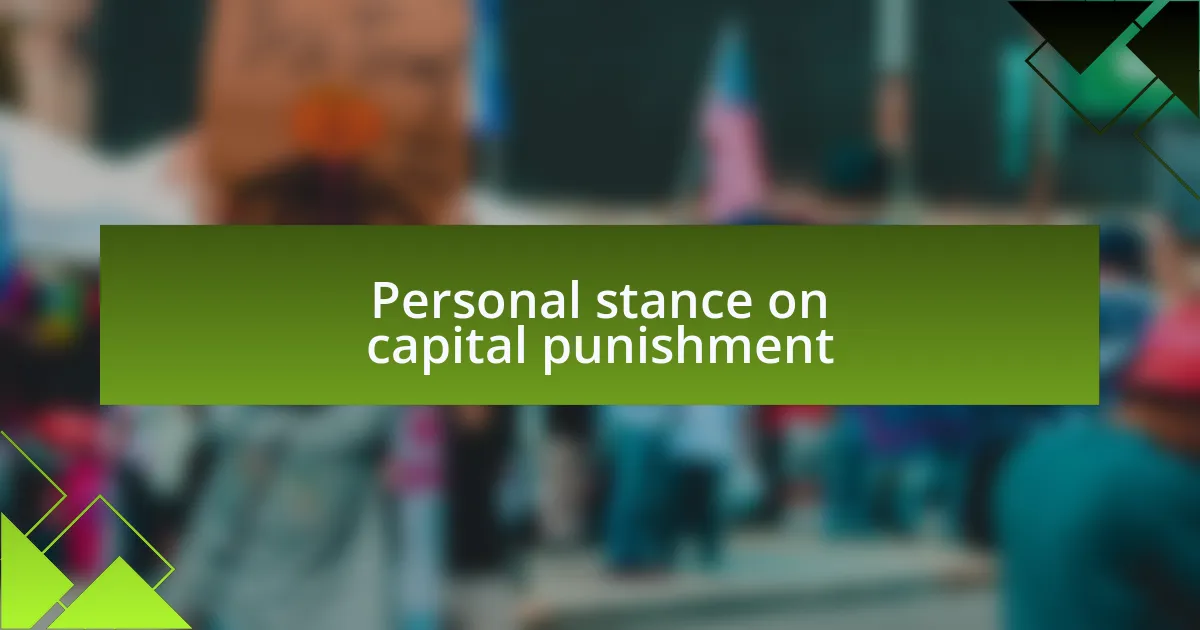
Personal stance on capital punishment
When it comes to my personal stance on capital punishment, I lean firmly against it. I remember a conversation I had with a close friend who lost a loved one to violent crime. While she initially supported the death penalty as a means of justice, she later expressed doubts after learning about wrongful convictions. It struck me how our views can evolve through understanding. Isn’t it fascinating how our perspectives on such a serious issue can shift with new insights?
I’ve often found myself grappling with the ethical implications of taking a life, even in the name of justice. When I think about the irreversible nature of capital punishment, it fills me with apprehension. Knowing that an innocent person could suffer such a fate sends chills down my spine. How can we justify a system that might wrongfully claim someone’s life? My heart always leans towards the belief that life, even for those who’ve committed heinous crimes, still holds value.
Another layer to my opposition stems from the social implications of capital punishment. I recall reading about the disproportionate impact on marginalized communities, which made me question the fairness of the entire system. The idea that one’s socio-economic status or race could determine life or death is not just alarming; it’s a reflection of deeper societal issues that we cannot ignore. Shouldn’t we strive for a justice system that uplifts rather than punishes?
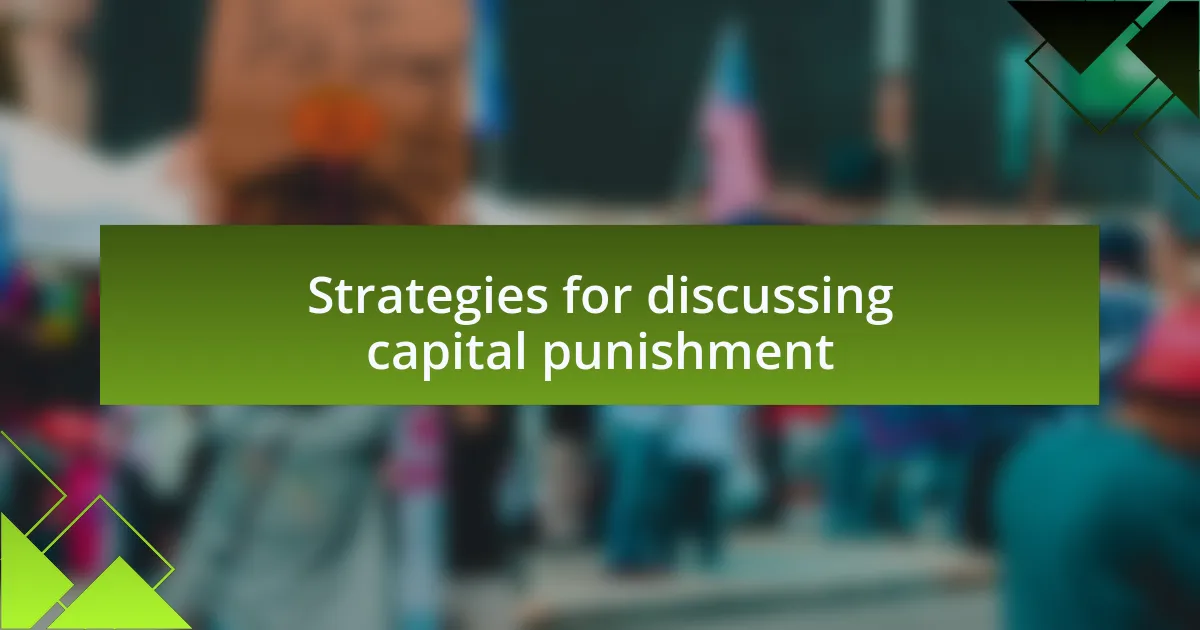
Strategies for discussing capital punishment
When discussing capital punishment, I find it helpful to approach the conversation with empathy and an open mind. For instance, the first time I talked about the death penalty at a community gathering, I discovered that listening can be just as powerful as speaking. By allowing others to share their stories and concerns, I realized that different experiences shape our views profoundly. How can we combat the polarized debate without first understanding each other’s perspectives?
I’ve also learned that framing the discussion around common values can bridge divides. During a debate with someone who initially supported the death penalty, I shifted the focus to our shared belief in justice and human rights. This helped us unpack the idea that justice does not have to equal retribution. Isn’t it possible that we can advocate for a more humane solution that aligns with our ethical principles while still addressing crime?
Lastly, using evidence and real-life examples can make a significant impact. I remember sharing a poignant article about a wrongful conviction that led to an innocent person being sentenced to death. The emotional weight of that story resonated with my audience, prompting many to reconsider their stance on the death penalty. How can we ignore the human element in a discussion that affects lives so profoundly? By highlighting personal narratives and factual accounts, we create a more compelling and thoughtful dialogue.
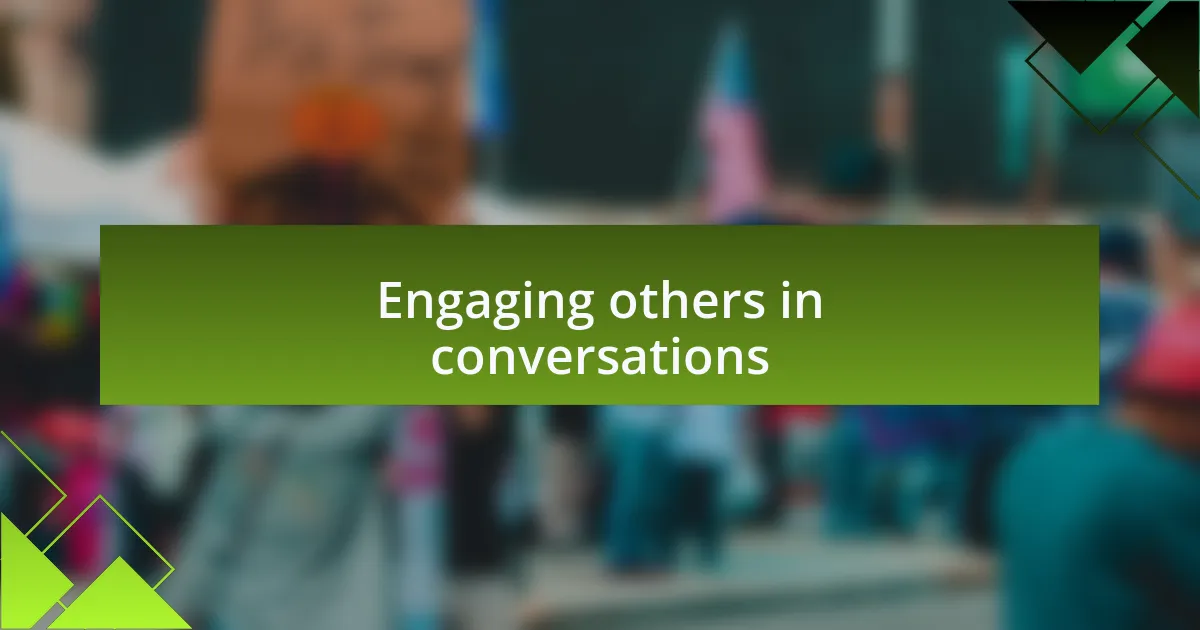
Engaging others in conversations
When I engage others in conversations about capital punishment, I often start with a personal story that highlights the emotional toll of this issue. I once met a man who had lost his brother to a violent crime; he initially supported the death penalty. However, after hearing about how a wrongful execution had shattered another family’s life, we both pondered—what does justice truly mean? Sharing these human experiences opens a pathway for more meaningful dialogue.
In another conversation, I found that asking open-ended questions encouraged reflection. I once asked a group, “What do you think is more effective in reducing crime: punishment or prevention?” This simple question ignited a vibrant discussion, as we began to explore the root causes of criminal behavior. I realized that creating a safe space for these conversations allows individuals to think critically about their beliefs and deepen their understanding.
Additionally, I discovered that a non-confrontational tone can change the atmosphere of the conversation entirely. During a town hall meeting, instead of stating facts or making accusations, I shared my own doubts about the death penalty’s fairness. I said, “Sometimes I wonder if we’re really seeking justice or just a sense of closure.” This approach fostered collaboration over conflict, encouraging others to weigh their thoughts without feeling defensive, which helped us collectively explore the nuances of this complex issue.